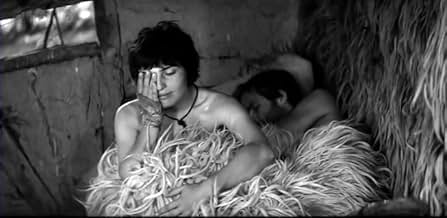After witnessing his wife's rape and murder during Ottoman rule, a traumatized Bulgarian knight, Kara Ivan, retreats to the mountains where he raises his young daughter alone among the goats... Read allAfter witnessing his wife's rape and murder during Ottoman rule, a traumatized Bulgarian knight, Kara Ivan, retreats to the mountains where he raises his young daughter alone among the goats.After witnessing his wife's rape and murder during Ottoman rule, a traumatized Bulgarian knight, Kara Ivan, retreats to the mountains where he raises his young daughter alone among the goats.
- Awards
- 5 wins & 1 nomination total
- Director
- Writer
- All cast & crew
- Production, box office & more at IMDbPro
8.23K
1
2
3
4
5
6
7
8
9
10
Featured reviews
Excellent movie, a Bulgarian equivalent to Italian neo-realism
This is an excellent movie, the Bulgarian equivalent to an Italian neo-realism masterpiece. The degree of freedom to artistic expression is extra-ordinary, especially if replaced into the context of the political environment prevailing in Bulgaria in the 70s. The practical absence of dialogue and music, (except for a very beautiful vocal), and the Black and White image emphasize the dramatic content of the movie. The direction is remarkable, and the play is first-class. Definitely, the best Bulgarian movie, and a must-see for every cinephile.
Visual poetry at its best
"Kozijat Rog" is by far the best Bulgarian film ever made.
It has all the characteristics of greatness: a story that lacks nothing of the dramatic depths of classical tragedy; a frugal style of visual narrative that is both monumental and subtle; acting that is as good as real-life; and last but not least - music that is impossible to forget.
"Kozijat Rog" is conducted in the ways of old - with the power and gentleness of a true master. And although color loses its saturation with the passing of time, this film will not, for it is shot in black-and-white.
It has all the characteristics of greatness: a story that lacks nothing of the dramatic depths of classical tragedy; a frugal style of visual narrative that is both monumental and subtle; acting that is as good as real-life; and last but not least - music that is impossible to forget.
"Kozijat Rog" is conducted in the ways of old - with the power and gentleness of a true master. And although color loses its saturation with the passing of time, this film will not, for it is shot in black-and-white.
Good start but end of film a bit letdown for me
I was very much taken in by the movie in the start. Not to the point where i would say masterpiece but a solid and interesting approach to things. Unfortunately a film of this character only have a few viable endings and for me I think it was fast limited further down.
I did think the acting was good and I do think the landscapes was beautiful. But I felt the story lacked some development outside the very narrow scope of the father and the girl. And I did also think there was lack of character progression besides one of the main characters.
It is by no means a bad movie. I just felt if could easily have achieved so much more than ending up being a very average movie.
Movie about the strength of a Woman and a land under slavery
Be whatever oppression comes upon, there is always a strong spirit to rise.
And in todays times, when more than ever it is important to cherish and value the true power of women, the main Lady character - one to bear the strength and banner of rising against all violence and subjugation, defying that only a man can liberate or bring justice is a vital sign of what women can do.
Beyond that, we can learn to renounce the slavery against humans and see the true vandalism against humans it brought. A movie, that beautifully and with few words brings up great human rights to a pedestal.
As a cinematography, this is shot very much in the spirit of the classic cinema, enchaining the viewers experience in creating a visual a musical harmony and art masterpiece. A story remains in our minds and brains not with the words, but with the emotions, and this movie draws on free spirit and justice as true human emotional pillars.
10major
The authors denounce violence against human nature and defend the right to personal freedom
One of outstanding Bulgarian films, One of the best screen versions of a short stories by Nikolai Haitov. This film is at once a parable and tragedy revealing by mean of lean dialogue and great dramatic tension the cruel history of Karaivan and his daughter Maria. The filmmakers - screenwriter Nikolai Haitov, director Metodi Andonov, cinematographer Dimo Kolarov, production designer Konstantin Dzhidrov,theme song written and performed by Mariya Neykova and at last, but not at least - the main actors Anton Gorcheb and Katya Paskaleva - denounce violence against human nature and defend the right to personal freedom. Katya Paskaleva played brilliantly two main female characters - this one of the mother and second one of Maria. After this film she became a great Bulgarian movie star.
Did you know
- TriviaBulgarian submission for the Academy Awards in the Best Foreign Language Film category, in 1973.
- GoofsAt c.33 minutes the corpse is face down when it lands in the grave. In the next shot its position has changed to face upwards.
- ConnectionsReferenced in I Spit on Your Grave (1978)
- How long is The Goat Horn?Powered by Alexa
Details
- Runtime
- 1h 45m(105 min)
- Color
- Sound mix
- Aspect ratio
- 2.35 : 1
Contribute to this page
Suggest an edit or add missing content



















